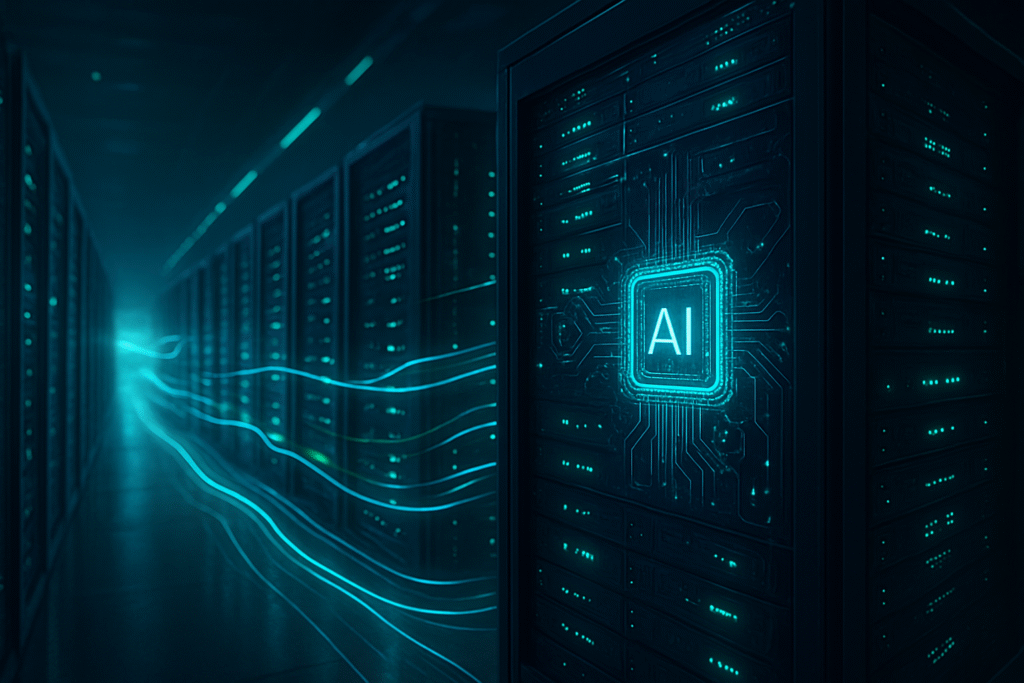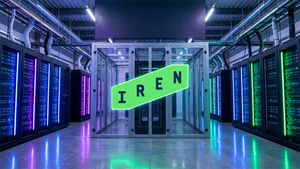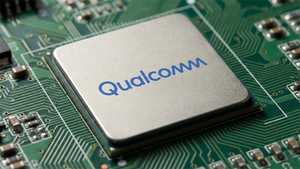
Round Rock, TX – October 7, 2025 – Dell Technologies (NYSE: DELL) today unveiled a significantly boosted financial outlook, nearly doubling its annual profit growth target and dramatically increasing revenue projections, all thanks to the insatiable global demand for Artificial Intelligence (AI) infrastructure. This announcement, made during a pivotal meeting with financial analysts, underscores a transformative shift in the tech industry, where the foundational hardware supporting AI development is becoming a primary driver of corporate growth and market valuation. Dell's robust performance signals a new era of infrastructure investment, positioning the company at the forefront of the AI revolution.
The revised forecasts paint a picture of aggressive expansion, with Dell now expecting earnings per share to climb at least 15% each year, a substantial leap from its previous 8% estimate. Annual sales are projected to grow between 7% and 9% over the next four years, replacing an earlier forecast of 3% to 4%. This optimistic outlook is a direct reflection of the unprecedented need for high-performance computing, storage, and networking solutions essential for training and deploying complex AI models, indicating that the foundational layers of AI are now a booming market.
The Technical Backbone of the AI Revolution
Dell's surge is directly attributable to its Infrastructure Solutions Group (ISG), which is experiencing exponential growth, with compounded annual revenue growth now projected at an impressive 11% to 14% over the long term. This segment, encompassing servers, storage, and networking, is the engine powering the AI boom. The company’s AI-optimized servers, designed to handle the immense computational demands of AI workloads, are at the heart of this success. These servers typically integrate cutting-edge Graphics Processing Units (GPUs) from industry leaders like Nvidia (NASDAQ: NVDA) and Advanced Micro Devices (NASDAQ: AMD), along with specialized AI accelerators, high-bandwidth memory, and robust cooling systems to ensure optimal performance and reliability for continuous AI operations.
What sets Dell's current offerings apart from previous enterprise hardware is their hyper-specialization for AI. While traditional servers were designed for general-purpose computing, AI servers are architected from the ground up to accelerate parallel processing, a fundamental requirement for deep learning and neural network training. This includes advanced interconnects like NVLink and InfiniBand for rapid data transfer between GPUs, scalable storage solutions optimized for massive datasets, and sophisticated power management to handle intense workloads. Dell's ability to deliver these integrated, high-performance systems at scale, coupled with its established supply chain and global service capabilities, provides a significant advantage in a market where time-to-deployment and reliability are paramount.
Initial reactions from the AI research community and industry experts have been overwhelmingly positive, highlighting Dell's strategic foresight in pivoting towards AI infrastructure. Analysts commend Dell's agility in adapting its product portfolio to meet emerging demands, noting that the company's comprehensive ecosystem, from edge to core to cloud, makes it a preferred partner for enterprises embarking on large-scale AI initiatives. The substantial backlog of $11.7 billion in AI server orders at the close of Q2 FY26 underscores the market's confidence and the critical role Dell plays in enabling the next generation of AI innovation.
Reshaping the AI Competitive Landscape
Dell's bolstered position has significant implications for the broader AI ecosystem, benefiting not only the company itself but also its key technology partners and the AI companies it serves. Companies like Nvidia (NASDAQ: NVDA) and AMD (NASDAQ: AMD), whose high-performance GPUs and CPUs are integral components of Dell's AI servers, stand to gain immensely from this increased demand. Their continued innovation in chip design directly fuels Dell's ability to deliver cutting-edge solutions, creating a symbiotic relationship that drives mutual growth. Furthermore, software providers specializing in AI development, machine learning platforms, and data management solutions will see an expanded market as more enterprises acquire the necessary hardware infrastructure.
The competitive landscape for major AI labs and tech giants is also being reshaped. Companies like Elon Musk's xAI and cloud providers such as CoreWeave, both noted Dell customers, benefit directly from access to powerful, scalable AI infrastructure. This enables them to accelerate model training, deploy more sophisticated applications, and bring new AI services to market faster. For other hardware manufacturers, Dell's success presents a challenge, demanding similar levels of innovation, supply chain efficiency, and customer integration to compete effectively. The emphasis on integrated solutions, rather than just individual components, means that companies offering holistic AI infrastructure stacks will likely hold a strategic advantage.
Potential disruption to existing products or services could arise as the cost and accessibility of powerful AI infrastructure improve. This could democratize AI development, allowing more startups and smaller enterprises to compete with established players. Dell's market positioning as a comprehensive infrastructure provider, offering everything from servers to storage to services, gives it a unique strategic advantage. It can cater to diverse needs, from on-premise data centers to hybrid cloud environments, ensuring that enterprises have the flexibility and scalability required for their evolving AI strategies. The ability to fulfill massive orders and provide end-to-end support further solidifies its critical role in the AI supply chain.
Broader Significance and the AI Horizon
Dell's remarkable growth in AI infrastructure is not an isolated event but a clear indicator of the broader AI landscape's maturity and accelerating expansion. It signifies a transition from experimental AI projects to widespread enterprise adoption, where robust, scalable, and reliable hardware is a non-negotiable foundation. This trend fits into the larger narrative of digital transformation, where AI is no longer a futuristic concept but a present-day imperative for competitive advantage across industries, from healthcare to finance to manufacturing. The massive investments by companies like Dell underscore the belief that AI will fundamentally reshape global economies and societies.
The impacts are far-reaching. On one hand, it drives innovation in hardware design, pushing the boundaries of computational power and energy efficiency. On the other, it creates new opportunities for skilled labor in AI development, data science, and infrastructure management. However, potential concerns also arise, particularly regarding the environmental impact of large-scale AI data centers, which consume vast amounts of energy. The ethical implications of increasingly powerful AI systems also remain a critical area of discussion and regulation. This current boom in AI infrastructure can be compared to previous technology milestones, such as the dot-com era's internet infrastructure build-out or the rise of cloud computing, both of which saw massive investments in foundational technologies that subsequently enabled entirely new industries and services.
This period marks a pivotal moment, signaling that the theoretical promises of AI are now being translated into tangible, hardware-dependent realities. The sheer volume of AI server sales—projected to reach $15 billion in FY26 and potentially $20 billion—highlights the scale of this transformation. It suggests that the AI industry is moving beyond niche applications to become a pervasive technology integrated into nearly every aspect of business and daily life.
Charting Future Developments and Beyond
Looking ahead, the trajectory for AI infrastructure is one of continued exponential growth and diversification. Near-term developments will likely focus on even greater integration of specialized AI accelerators, moving beyond GPUs to include custom ASICs (Application-Specific Integrated Circuits) and FPGAs (Field-Programmable Gate Arrays) designed for specific AI workloads. We can expect advancements in liquid cooling technologies to manage the increasing heat generated by high-density AI server racks, along with more sophisticated power delivery systems. Long-term, the focus will shift towards more energy-efficient AI hardware, potentially incorporating neuromorphic computing principles that mimic the human brain's structure for drastically reduced power consumption.
Potential applications and use cases on the horizon are vast and transformative. Beyond current AI training and inference, enhanced infrastructure will enable real-time, multimodal AI, powering advanced robotics, autonomous systems, hyper-personalized customer experiences, and sophisticated scientific simulations. We could see the emergence of "AI factories" – massive data centers dedicated solely to AI model development and deployment. However, significant challenges remain. Scaling AI infrastructure while managing energy consumption, ensuring data privacy and security, and developing sustainable supply chains for rare earth minerals used in advanced chips are critical hurdles. The talent gap in AI engineering and operations also needs to be addressed to fully leverage these capabilities.
Experts predict that the demand for AI infrastructure will continue unabated for the foreseeable future, driven by the increasing complexity of AI models and the expanding scope of AI applications. The focus will not just be on raw power but also on efficiency, sustainability, and ease of deployment. The next wave of innovation will likely involve greater software-defined infrastructure for AI, allowing for more flexible and dynamic allocation of resources to meet fluctuating AI workload demands.
A New Era of AI Infrastructure: Dell's Defining Moment
Dell's boosted outlook and surging growth estimates underscore a profound shift in the technological landscape: the foundational infrastructure for AI is now a dominant force in the global economy. The company's strategic pivot towards AI-optimized servers, storage, and networking solutions has positioned it as an indispensable enabler of the artificial intelligence revolution. With projected AI server sales soaring into the tens of billions, Dell's performance serves as a clear barometer for the accelerating pace of AI adoption and its deep integration into enterprise operations worldwide.
This development marks a significant milestone in AI history, highlighting that the era of conceptual AI is giving way to an era of practical, scalable, and hardware-intensive AI. It demonstrates that while the algorithms and models capture headlines, the underlying compute power is the unsung hero, making these advancements possible. The long-term impact of this infrastructure build-out will be transformative, laying the groundwork for unprecedented innovation across all sectors, from scientific discovery to everyday consumer applications.
In the coming weeks and months, watch for continued announcements from major tech companies regarding their AI infrastructure investments and partnerships. The race to provide the fastest, most efficient, and most scalable AI hardware is intensifying, and Dell's current trajectory suggests it will remain a key player at the forefront of this critical technological frontier. The future of AI is being built today, one server rack at a time, and Dell is supplying the blueprints and the bricks.
This content is intended for informational purposes only and represents analysis of current AI developments.
TokenRing AI delivers enterprise-grade solutions for multi-agent AI workflow orchestration, AI-powered development tools, and seamless remote collaboration platforms. For more information, visit https://www.tokenring.ai/.






